Today is Rally for Girls Sports Day, an annual event hosted by the National Women’s Law Center (NWLC) to raise address the fact that girls are still not receiving equal opportunities in high school sports programs. According to the NWLC, schools across the country don’t provide equal opportunities for girls to participate in sports, and some are even cutting athletic opportunities in ways that exacerbate existing gender inequities or create new ones.
And there is a ton of research documenting the many benefits of sports in the lives of girls. As outlined by the Women’s Sports Foundation, girls who participate in sports are more likely to get better grades and graduate than girls who don’t play sports, are less likely to have an unwanted pregnancy in school than girls who don’t play sports, have higher levels of confidence and self-esteem and lower levels of depression than girls who don’t play sports, have a more positive body image than girls who don’t play sports, may reduce their risk of breast cancer by up to 50%, may reduce the risk of osteoporosis (brittle bones) in older age, and will learn valuable lessons about team-building, goal-setting and the pursuit of excellence, which crosses over into other areas of life.
When schools don’t offer the same opportunities for girls to participate in sports as they do for boys, they’re creating an unequal playing field for the future (pun intended). As the NWLC’s brief reports:
Playing sports keeps students engaged in school and thus can help to improve graduation rates around the country. Young women who play sports are more likely to graduate from high school, have higher grades, and score higher on standardized tests than non-athletes. Female athletes are also more likely to do well in science classes than their classmates who do not play sports.20 In addition, the availability of athletic scholarships dramatically increases a young woman’s ability to pursue a college education and to choose from a wider range of colleges and universities.
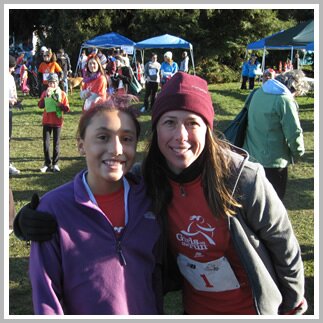 To do my part for today’s Rally for Girls Sports Day, I wanted to highlight an organization that is working hard to ensure girls can reap the benefits of sports.This past weekend I had the pleasure of being a running buddy with Girls on the Run, a learning program for girls ages 8 to 13 years old which combines training for a 3.1 mile running event with self-esteem enhancing, uplifting workouts. The goals of the programs are to encourage positive emotional, social, mental, spiritual and physical development. This fall, more than 350 girls in my hometown of Seattle had a chance to participate.
To do my part for today’s Rally for Girls Sports Day, I wanted to highlight an organization that is working hard to ensure girls can reap the benefits of sports.This past weekend I had the pleasure of being a running buddy with Girls on the Run, a learning program for girls ages 8 to 13 years old which combines training for a 3.1 mile running event with self-esteem enhancing, uplifting workouts. The goals of the programs are to encourage positive emotional, social, mental, spiritual and physical development. This fall, more than 350 girls in my hometown of Seattle had a chance to participate.
I’ve been involved with Girls On The Run for the past 5 or so years, coaching girls for a few seasons and being a running buddy for the past three. As a running buddy, I get paired with one girl for both the practice and actual 5K, so she feels supported throughout the whole thing. And me, well, I just get to enjoy the warm and fuzzies from sharing in this experience with a young girl who is pushing herself outside her comfort zone.
And this past Sunday was no exception, especially about the comfort zone part, as it was in the low thirties with the added bonus of what felt like an Arctic “breeze” coming off Lake Washington to make sure we were near frozen before the race even started. Despite the less-than-ideal conditions, my runner, Sophie, kept a positive attitude the whole time. She and her friend decided they wanted to try and be the first Girls on the Run girls to cross the finish line, so we all weaseled our way up to the start line and took off like mad when the starting horn finally went off.
After I caught up with her starting-line sprint, we tackled a killer hill in the first mile, and enjoyed long easy strides as we coasted down it. With the hill out of the way, the rest of the course was pretty flat, so we focused on recovering from the hill, managing our breathing, and finding a pace that we could keep steady. Sophie stayed strong, and with about a half-mile to go, we decided to kick it in, sprinting for the finish line. Sophie came in 4th out of all the girls, and her friend from the start of the race came in 1st! I was so proud of my runner, and so honored to have gotten to share this experience with her!
As a runner and a girl advocate, it’s no surprise that I love what Girls on the Run stands for. I’ve said it many times before on this blog, and I’ll say it again. Running is a HUGE part of my emotional well-being. It has given back to me in more ways than I can possibly list here, and I think it is an incredibly empowering activity for women and girls. So how awesome is it that GOTR introduces girls to running, all the while offering empowering information on everything from media literacy to self-respect and providing girls with true role models to show the benefits of running? Pretty awesome.
Girls on the Run is offered in the fall and spring all across the U.S. If you’re interested in learning more about the program or how to get involved, visit the main website here and look for a chapter near you! And if you’re interested in trying out running for yourself but don’t know where to start, check out my book Run for Your Life: A Book for Beginning Runners!
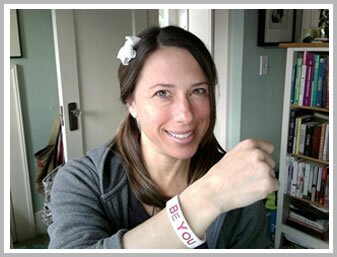 There are three things you need to know about Emily-Anne Rigal, a.k.a. The Schmiddlebopper. 1) She is one of the kindest, motivated, inspirational, forward-thinking young gals I know, 2) she wears bows in her hair every day, and 3) she is the founder of the nonprofit WeStopHate which is reaching thousands of teens with its message of “teen esteem.”
There are three things you need to know about Emily-Anne Rigal, a.k.a. The Schmiddlebopper. 1) She is one of the kindest, motivated, inspirational, forward-thinking young gals I know, 2) she wears bows in her hair every day, and 3) she is the founder of the nonprofit WeStopHate which is reaching thousands of teens with its message of “teen esteem.”
 To do my part for today’s
To do my part for today’s 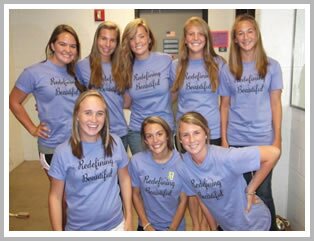
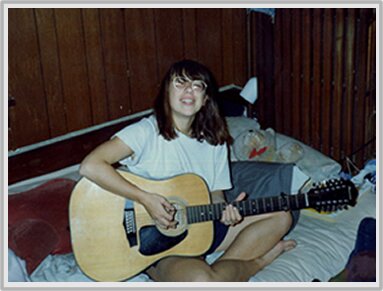
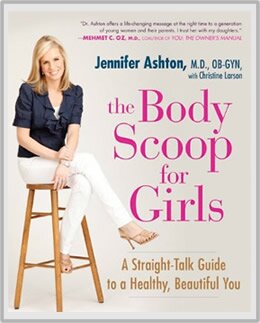
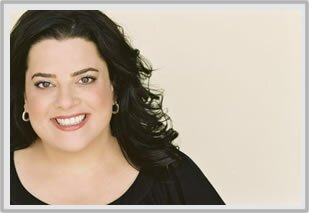 I’m so excited to share the news that self-esteem guru, honorary Smart Girl, and friend, Jess Weiner, has just premiered
I’m so excited to share the news that self-esteem guru, honorary Smart Girl, and friend, Jess Weiner, has just premiered 

